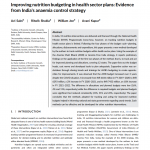
Access to Information and Accountability: The Story of Vijaipura Panchayat
2 August 2010
Unlike its predecessor the Sampooran Grameen Rozgar Yojna (SGRY), the National Rural Employment Guarantee Act (NREGA), 2005 outlines an impressive list of transparency and accountability mechanisms to ensure that administrators are answerable and responsible to people for their behaviour and actions. Such measures include the institution of grievance redressal mechanisms, proactive disclosure of information, and community monitoring mechanisms such as Social Audits. In June this year a team of us visited Vijaipura Panchayat in Rajasthan to understand the extent to which these measures were being implemented.
Vijaipura is a seemingly innocuous Panchayat set in a dusty drought ridden landscape, with little to boast apart from a view of the petering Aravalis. The fecundity of the land being all but despoiled has little to offer to its four thousand odd residents who survive largely as subsistence farmers or livestock rears. In such a hostile environ, NREGA emerges as the sole guy, railing in the several desperate souls from experiencing another more trenchant aspect of poverty.
The distinguishing feature of Vijaipura is the long standing relationship that the people of the region share with the Mazdoor Kisan Shaki Sangathan (MKSS). Since the 1980’s residents of Vijaipura have supported and been part of the movement’s activities. In recent history with the launching of the NREGA in 2008[1], the movement has played a critical role in spreading awareness on the rights and entitlements guaranteed in the Act.
Given the important role played by the MKSS, it was assumed that at least in Vijaipura, workers would be suitably empowered to demand accountability, if their rights were violated. Contrary to such assumptions our findings from interviews with workers and officials revealed that even in Vijaipura, significantly higher awareness levels of workers did not translate into greater exercise of voice. As per the official records only two formal complaints have been registered in Vijaipura. Out of these, one complaint relating to delays in payment of wages turned out to be bogus. Other complaints were informally registered, mostly orally. Surprisingly, 88.8% of the complaints were not formally registered with the recipient authorities. In only 44% of the cases complainants were given assurances that their complaints would be resolved within the designated period. In 55% of the cases the respondents claimed that the complaints had not been investigated. Further, only 60% of respondents asserted that their complaint had resulted in a satisfactory outcome. However even in their case, the formal complaint was as such not properly investigated, it was only after pressure was applied that the officials finally acceded to the demands of the labourers[2].
According to our preliminary analysis, it appears that reasons for low rates of complaints in Vijaipura are attributable to the nature of the systems of grievance redressal. Such a system obliged individuals to take action in legally literate ways (Goetz and Gaventa 2001: 13). Workers who were illiterate or were unaware of the procedures involved in lodging complaints were unable to access such a system. To a certain extent then, learnings from the experiences of Vijaipura prompt an assessment of the ways in which accountability and transparency measures are designed, under the Act as well as more generally in other government programmes, and whether they are structurally defined to be participatory.
Gayatri Sahgal is a Research Analyst with the Accountability Initiative.
[1] NREGA was instituted in Vijaipura during the second phase in 2008.
[2] These findings are based on a quantitative survey conducted with a sample size of nine respondents. The sample size was partly based on official records and partly on the basis of snow balling technique through which other complainants were identified.





